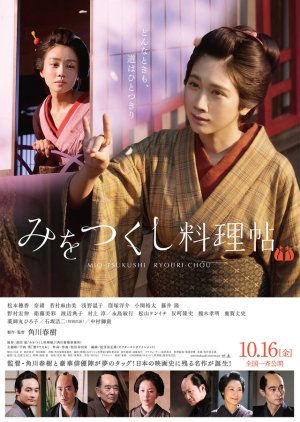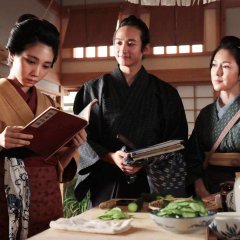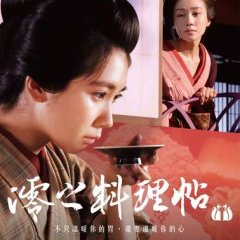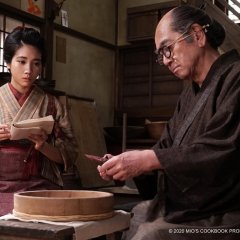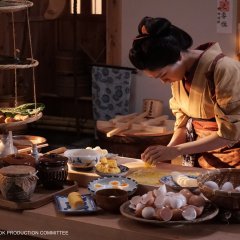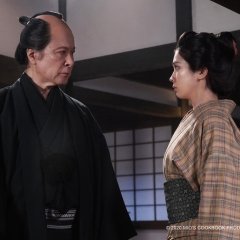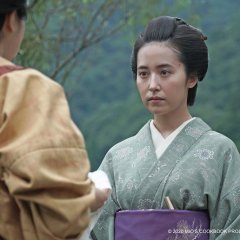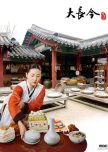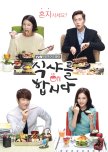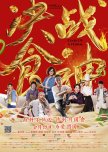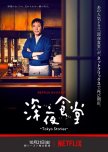 Noodle Cart: June
Noodle Cart: June - Français
- English
- magyar / magyar nyelv
- dansk
- Titre original: みをつくし料理帖
- Aussi connu sous le nom de: Mio-Tsukushi Ryouri-Chou
- Scénariste: Era Itaru, Matsui Kana
- Scénariste et Réalisateur: Kadokawa Haruki
- Genres: Culinaire, Historique, Drame
Distribution et équipes
- Matsumoto HonokaMioRôle principal
- NaoNoeRôle principal
- Wakamura MayumiYoshiRôle Secondaire
- Asano AtsukoOryoRôle Secondaire
- Kubozuka YosukeKomatsubaraRôle Secondaire
- Koseki YutaNagata GensaiRôle Secondaire
Critiques

Finding the right recipe
Perseverance, belief and hope, with a little bit of help from the Fox spirit and a whole lot of experimenting along the way. There are many insights to be gleaned from Mio’s Cookbook - not only on life during the Edo period of Japan or the culinary delights of the era, but also on the profound depths of friendship between two individuals even when faced with the uncertainty of tragedy, as well as the vicissitudes of life.Mio and Noe were the best of childhood friends until the great floods of Osaka in 1802 took everything away from them, and separated them from each other. Unbeknownst to them, they survived the calamity only to experience the harsh realities of fending for themselves without the love and care of their families who had perished in the disaster. The narrative focuses on their respective journeys of self discovery a decade later in Edo, where both Mio and Noe would eventually cross paths.
Mio’s Cookbook is the fourth adaptation, the first in a feature-length film format, of the award-winning period book series Mi Otsukushi Cookbook by Kaoru Takada that was serialised in 10 volumes from 2009 to 2014. Based on the screenplay by Itaru Era, Kana Matsui, and Haruki Kadokawa who also directed the film in what would be his last project. The music score was composed by Masataka Matsutoya while the theme song Chiritenao is sung by Aoi Teshima. Principal photography took place at the Nikko Edomura theme park in Nikko City, Tochigi Prefecture and Toho Studio in Tokyo.
What I Loved
This film will go into my all-time favourite list as one of the best produced period productions that I have seen. So much care and effort have been taken in bringing to life the vivid details of the Edo period; not only in terms of the quality and extravagance of the set designs, artistic direction and costumes but also through the beauty of the expertly choreographed traditional dance sequences. These scenes are gorgeously presented by the exceptional cinematography all throughout with well-rendered cinematic colour grading and the kind of classical colour palette that suits the historical genre very appropriately indeed.
The original score is a technical aspect upon which I simply have to lavish praise. Incorporating elements of traditional music performed live with authentic instruments have enhanced the production levels even further and certainly during the performance sequences.
I appreciated the heartwarming story of friendships forged while overcoming adversity and, in the case of Mio, amidst culinary experimentation in her progression towards becoming an established chef. At its core, the narrative isn’t overly complicated and is structured in a somewhat nuanced and delicate storytelling style. I like the “less is more” approach that emphasises the dimensions of the dialogue, expressions of the mood and atmospherics of the moment rather than over-reliance on excessive or exaggerated dramatics. Apart from the characterizations and direction, the acting generally fits with the overall ambience of the film. Some viewers may feel that the pace is too slowburn for their liking but personally, I enjoyed the subtlety of the plot progression and character development.
I have no major complaints with the casting and general performances of the main leads. I think Matsumoto Honoka and Nao are perfect as Mio and Noe respectively. In addition to their commendable individual interpretations of the roles, the palpable chemistry between them convincingly drives the narrative right to its conclusive and poignant ending. If anything, I would love for a sequel that features both actresses once more, in the near future because there is so much potential to their characters that warrant a continuation of their friendship as they navigate the next phase of their lives.
Final Thoughts
Despite the premise and the timeline setting, I would consider Mio’s Cookbook as a reasonably pleasant, heartfelt and inspiring viewing experience that is imbued with moderate complexity of emotions and manageable slice-of-life aspects. It will definitely tug at the heartstrings but in a positive way and rest assured, I believe the conclusion will put a smile on viewers’ faces, just as it did for me.
Cet avis était-il utile?

Cinema at its best!
One of the best movies I've ever watched, period.Okay, further elaborating on that...what should I name first?
Perhaps the absolutely perfect script, portraying a beautiful, delicate, poetic story of friendship?
Or maybe the fabulous cinematography, which makes it feel almost as if an endless collection of wonderful paintings were seamlessly flowing one after the other in front of the viewers' delighted eyes?
Or maybe again, the superb performance delivered by the whole cast, with a virtual standing ovation for Matsumoto Honoka?
And why not the lovely music, or the marvelous dishes, or any other element of this magnificent production?
Seriously, cinema at its best. Wow, just wow!
Cet avis était-il utile?
Recommandations
There have been no recommendations submitted. Be the first and add one.

